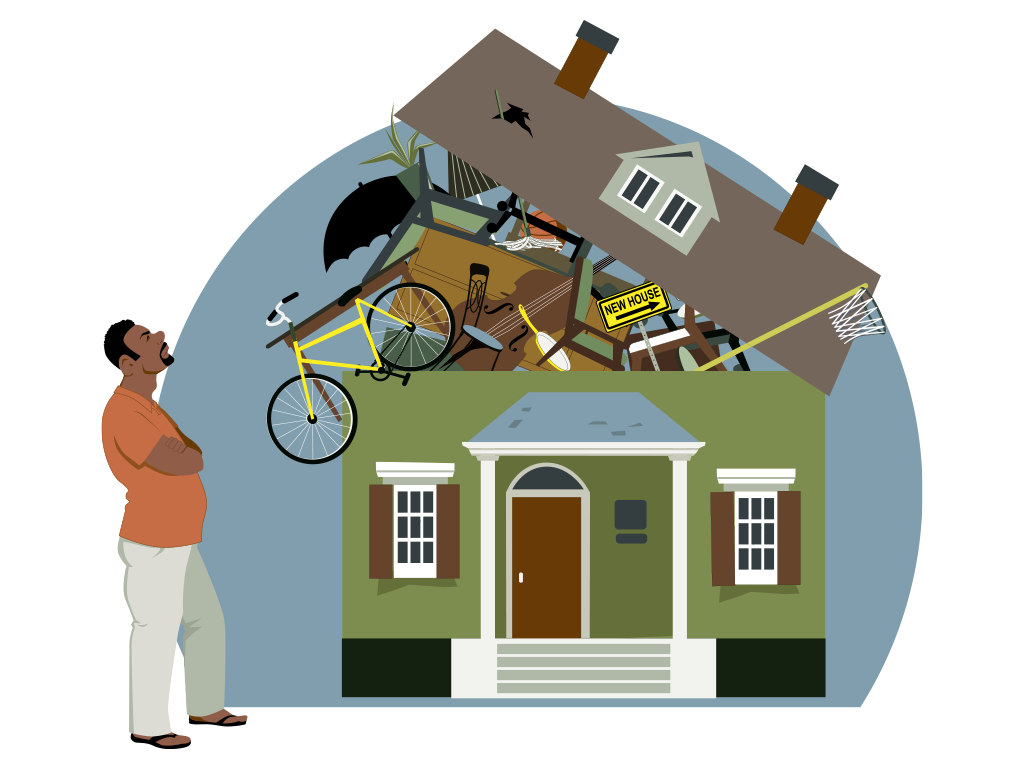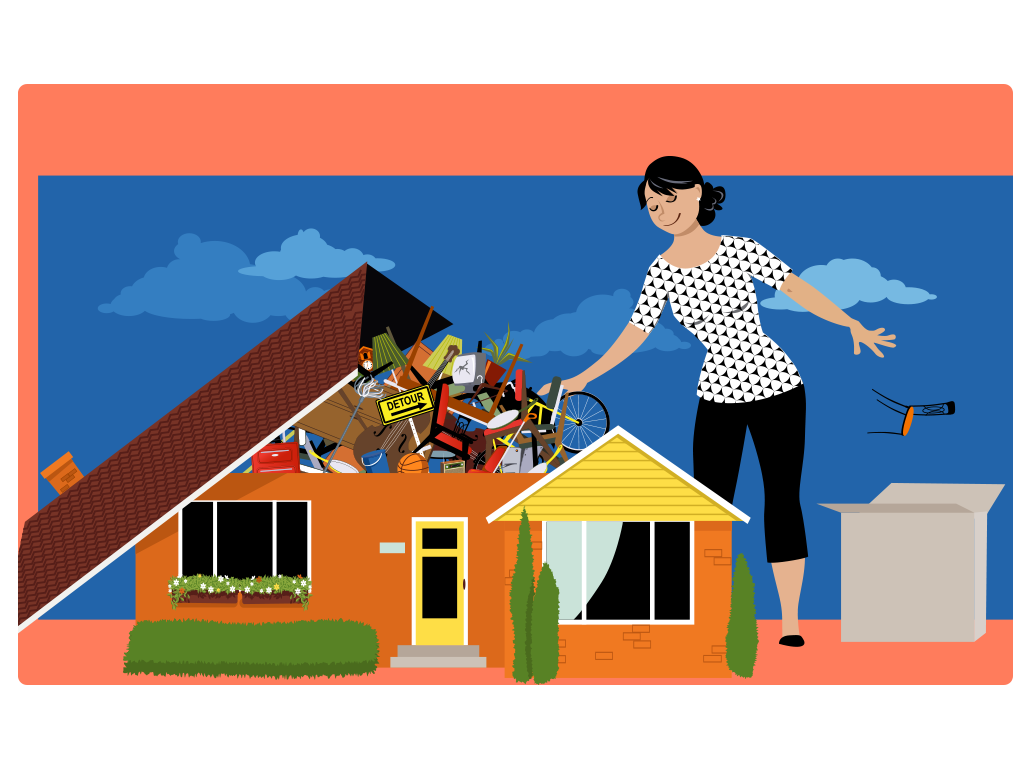Is There a Connection Between ADHD and Hoarding?

When someone encounters a home where clutter has accumulated beyond what is reasonable, the immediate assumption is someone in the home has ADHD and or hoarding disorder. In more cases than not, that would be an appropriate assumption. That raises the question, “Are these two mental disorders one and the same?” The answer is yes and no. Confused? Please keep reading.
Even though there are similarities between these two disorders, they are in fact different disorders per the American Psychiatric Association. However, there is a line that if crossed is where ADHD and collecting things obsessively (hoarding) become interconnected.
Given the serious nature of these disorders, an investigation into the relationship between both disorders seems prudent. We’ll start by looking at each disorder separately and then move to connect the dots.

11+ Years Experience dealing with Hoarding
Need someone to talk to that understands hoarding?
Get a Free Hoarding Clean-up Estimate.
Or call us today for immediate assistance.
What is ADHD?
Attention-deficit/hyperactivity disorder (ADHD) is a mental disorder that mostly affects children. However, many children carry their ADHD symptoms into adulthood, especially if not treated properly.
Types and Symptoms of ADHD
There are three basic types of ADHD: inattentive, hyperactive, and a combination of these two or inattentive/hyperactive ADHD. The symptoms of ADHD in adults include the following:
- Lack of attention to details
- Difficulty focusing on a single task
- Disorganized thinking
- Trouble listening for even short periods
- Often losing or misplacing items
- Procrastination
- Fidgeting – constant body movements (legs and arms)
- Chronic restlessness
- Sleeping difficulties
Causes of ADHD
While the causes of ADHD have been difficult for researchers to pin down, the evidence suggests three things could cause this disorder. First, there seems to be a genetic component more often than not. Second, differences in brain development can cause this disorder. Finally, issues during mom’s pregnancy and or during childbirth can create the same kind of brain development issues.
Treatment of ADHD
The two best treatment methods appear to be Parent-Child Interaction Therapy (PCIT) and medicinal intervention. It’s important to note that doctors will take great care before they start prescribing ADHD-approved medication for small children.
What is Hoarding Disorder?

Hoarding is a mental disorder that’s normally found in adults. It is characterized by an individual’s irrational obsession with collecting things that seemingly have little to no value. To better understand this order, let’s take a look at some of the characteristics of hoarding disorder.
The Symptoms
Hoarding disorder comes with some very distinct symptoms. The most common ones would include the following:
- Desire to accumulate one or more items to the extreme
- Great difficulty parting with saved items
- Disorganized living environment – clutter
- Problems with planning and organizing
- Difficulty making decisions even small decisions
- Relationship issues due to messy living style
- Health issues due to living in unsanitary conditions
- Household pest issues
Why do people hoard?
Why hoarders hoard depends on the individual. The most common reasons that hoarders hoard certain items include:
- They sincerely believe the items they are hoarding have real value now and or in the future
- They have developed an emotional attachment to the items
- They were taught not to waste things
- They take comfort in being surrounded by the things they hoard
Complications caused by hoarding
The reason hoarding is such a serious disorder is because of the consequences of the behavior. The complications that come with hoarding disorder include:
- Tripping or falling over clutter
- Injury caused by falling items
- Trouble in personal relationships
- Legal issues with landlords and the local health department
- Health issues due to exposure to toxicity and bacteria
- Creation of a fire hazard
- Infestation by household pests
- Loneliness and isolation
- Inability to function properly at work or school
Diagnosing Hoarding Disorder
As is the case with ADHD, researchers have had difficulty trying to pin down the potential causes of hoarding disorder. The best they can guesstimate is it could have something to do with genetics, it being learned behavior, brain function issues, and or the occurrence of stressful life events.
Treating Hoarding Disorder
The best treatment options for hoarding disorder would appear to be evidence-based therapies like Cognitive Behavioral Therapy (CBT) and Dialectical Behavioral Therapy (DBT). Medication has also been proven to be successful in some cases. With that said, there is no FDA-approved medication on the market that is specifically approved for the treatment of hoarding disorder.
How are ADHD and Hoarding Connected?

After taking a look at the symptoms and characteristics of ADHD disorder and hoarding disorder separately, it becomes apparent that there might be a connection or crossover between these two disorders. However, there is no evidence that indicates a connection is always there. What the evidence indicates is that ADHD is a comorbidity of hoarding disorder.
According to a 2021-2022 study done in the UK, approximately 1 in 5 adults who have been diagnosed with ADHD have a dual diagnosis of hoarding disorder. That would suggest that while ADHD can lead to hoarding, it’s not something that happens very often.
The primary difference between these two disorders is that while a person with ADHD might be messy or untidy, it’s a random behavior. With hoarding disorder, the individual almost always has a very specific reason for their hoarding behavior.
In individuals who have ADHD and are collecting things (hoarding), they often display the symptoms that are common in both disorders of which we are discussing here. That commonality tends to focus on these symptoms:
- Inability to concentrate for long periods
- Difficulty multitasking
- Problems making decisions
- Often losing and misplacing items
To be clear, the dual diagnosis of these two disorders together needs to start with the premise that the individual has ADHD. That initial diagnosis is then used to explain at least a portion of the hoarding disorder. The treatment of these co-existing disorders would likely focus on the aforementioned CBT and or DBT.
How Clutter Trucker Can Help

Clutter Trucker is a professional junk removal company serving Denver, Colorado Springs, and adjacent communities. We specialize in helping customers clean up unwanted messes.
In our travels, we frequently encounter customers who are suffering from hoarding disorder and possible ADHD. To those individuals, we have great compassion for their plight.
If you or a loved one is suffering from hoarding disorder, we would like to suggest that part of treating this disorder will involve cleaning up clutter in the home. That is exactly what we love to do for our customers. We would be glad to come in and take care of managing your hoarding vs adhd clutter home cleanup. That will include removing the clutter, organizing the living environment, and making sure the home is safe.
You can take comfort in knowing that the items we remove will be handled appropriately. We’ll work with you to sell items that have value and to donate items that could be repurposed for the benefit of others. As for the remaining stuff, we will dispose of it responsibly with keeping the environment safe always being a high priority.
As a side note, we would like to participate in the treatment process as much as possible because we care. We are not mental healthcare providers, but we can provide you with a list of qualified mental healthcare providers who are serving your area.
We want to make a difference. That’s why the prices at Clutter Trucker are always reasonable and affordable. When you are ready to let go and want compassionate help in doing so, please give us a call at 720-802-6340 in Denver or 719-372-5009 in Colorado Springs.

About Jennifer Hanzlick
Clutter Trucker is a Denver-based hoarding clean-out company founded by Jennifer Hanzlick. Jennifer leveraged 15 years of corporate experience in to start the company in 2008. Her mission is to help and educate individuals and their loved ones who have hoarding disorder. A featured speaker at Ted X Boulder, Jennifer works directly with community and non-profit organizations to boost public awareness about the condition. To that end, she founded the Colorado Hoarding Task Force in 2015.
 720-982-7856
720-982-7856



